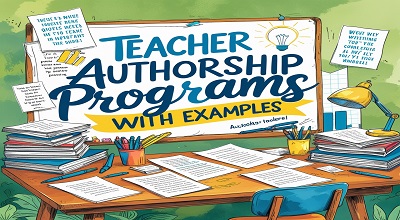Teacher Authorship Programs
Teacher Authorship Programs: Teacher authorship programs empower educators to create, publish, and share their knowledge through books, digital content, and curriculum materials. These programs provide teachers with platforms to monetize their expertise while contributing to the broader educational community.
With the rise of self-publishing and digital platforms, more teachers are turning to authorship as a way to supplement income, enhance professional development, and influence education beyond their classrooms.
Benefits of Teacher Authorship Programs
A. Professional Growth
- Enhances credibility and authority in the field.
- Encourages reflective teaching practices.
B. Financial Opportunities
- Royalties from book sales and digital content.
- Speaking engagements and consulting opportunities.
C. Impact on Education
- Sharing best practices with a global audience.
- Influencing curriculum development and policy.
D. Personal Fulfillment
- Creative expression and legacy building.
- Networking with other educators and authors.
Types of Teacher Authorship Programs
A. Traditional Publishing
- Partnering with educational publishers (e.g., Scholastic, Pearson).
- Requires proposals and manuscript submissions.
B. Self-Publishing
- Platforms like Amazon Kindle Direct Publishing (KDP), Teachers Pay Teachers (TPT).
- Greater creative control and higher royalties.
C. Institutional Programs
- School districts or universities sponsoring teacher-authored materials.
- Example: National Writing Project’s teacher publications.
D. Collaborative Authorship
- Co-writing books with other educators.
- Example: “The Courage to Teach” by Parker Palmer.
How to Get Started with Teacher Authorship?
Step 1: Identify Your Niche
- Classroom management, subject-specific guides, pedagogy, etc.
Step 2: Choose a Publishing Route
- Traditional vs. self-publishing.
Step 3: Develop Your Manuscript
- Outline, draft, and revise.
- Seek peer reviews.
Step 4: Market Your Work
- Leverage social media, blogs, and educator networks.
- Present at conferences.
Top Teacher Authorship Programs in 2025
A. Amazon Kindle Direct Publishing (KDP)
- Self-publish eBooks and paperbacks.
- High royalties (up to 70%).
B. Teachers Pay Teachers (TPT)
- Sell lesson plans, worksheets, and eBooks.
- Over 5 million educators use the platform.
C. Heinemann Publishing
- Specializes in professional development books for teachers.
- Accepts proposals from educators.
D. Edutopia’s Contributor Network
- Write articles and guides for a large educator audience.
E. National Council of Teachers of Mathematics (NCTM) Publications
- Publishes teacher-authored math resources.
Success Stories from Teacher Authors
A. Dave Burgess – “Teach Like a Pirate”
- Self-published, then picked up by a major publisher.
- Inspired thousands of teachers.
B. Erin Gruwell – “The Freedom Writers Diary”
- Turned classroom experiences into a bestselling book.
C. Teachers on TPT Making Six Figures
- Many educators earn substantial income selling resources.
Challenges and Solutions in Teacher Authorship
A. Time Constraints
- Solution: Write in small increments; use summer breaks.
B. Marketing Difficulties
- Solution: Leverage educator communities and social media.
C. Rejection from Publishers
- Solution: Consider self-publishing or revising proposals.
Future Trends in Teacher Authorship
- AI-Assisted Writing Tools: Helping teachers draft content faster.
- Interactive eBooks: Including videos and quizzes.
- Global Collaboration: Teachers co-authoring across borders.
Conclusion
Teacher authorship programs offer educators a powerful way to share knowledge, earn income, and shape education. With multiple publishing options available, teachers can choose the best path to bring their ideas to the world.
FAQs
Q1: Can teachers really make money from authorship?
A: Yes! Many educators earn royalties from books, TPT sales, and speaking engagements.
Q2: Do I need a literary agent to publish a book?
A: Not for self-publishing, but traditional publishers may require one.
Q3: How long does it take to write a teacher’s book?
A: Typically 6 months to 2 years, depending on complexity.
Q4: What’s the best platform for self-publishing?
A: Amazon KDP for books, TPT for teaching resources.
Q5: Can I publish anonymously?
A: Yes, some platforms allow pen names.
Free Download: TikTok Live APK
